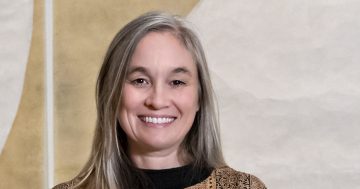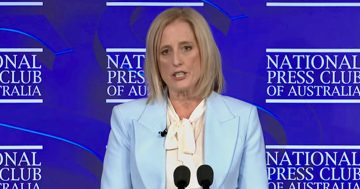
Yvette Berry (second from right) standing with representatives from ACT sporting boards. Photo: Region Media.
Gender equality on Canberra’s sporting boards is on the horizon with 28 government-funded organisations on track to reach a 40 per cent female representation benchmark by 2020.
The government has offered associations the incentive of a 10 per cent funding bonus, or around $5000, to achieve that benchmark by next year.
Minister for Sport and Recreation, and Minister for Women, Yvette Berry said about half of the 28 ACT sporting bodies that receive government funding were already there.
“We’ve got momentum in this country now with gender equality and making sure that women are rightly represented on sports boards,” she said.
“[Women are] more than 50 per cent of the community and that representation brings diversity and innovation to the work of sports communities, but it also gives women and girls the chance to see women represented on their peak sports bodies as well.
“It’s a really important message to women and girls, particularly young girls in sport about where they could be one day.”
Ms Berry said 40 per cent gave near-equal representation of women on many sporting boards, as many are odd-numbered, with seven or nine board positions.
Capital Football is employing a 4-4-2 formation on and off the pitch with chair and director of the board Fran Sankey telling Region Media that the organisation is committed to having 40 per cent male representation on the board, 40 per cent female representation, with 20 per cent remaining unallocated to any particular gender.
Both the Capital Football and Tennis ACT boards have a three, four board split favouring men, with a female CEO or Chair.
“I think tennis was the first sport that there was equality pay for participants at an elite level, so these are symbolic things in some ways because we’re talking community sport here but it really makes a difference,” says Tennis ACT board director Robyn Hendry. “So I’m proud to be associated with tennis, particularly as a female director.”
CEO of Volleyball ACT Adam Castle has commended the sport for having the most equal representation of men and women by participation rates, which is reflected in the board’s makeup, consisting of three men and women.
Ms Berry says help is available for organisations that may be struggling to reach equal representation by 2020, including accessing the ACT Government’s diversity register which can help organisations fill vacant positions.
“We’re going to work with those sports groups,” she said. “Some of it’s just about when they’re having their board elections and timeframes, and maybe the make-up of the statutes of their organisations.”





















